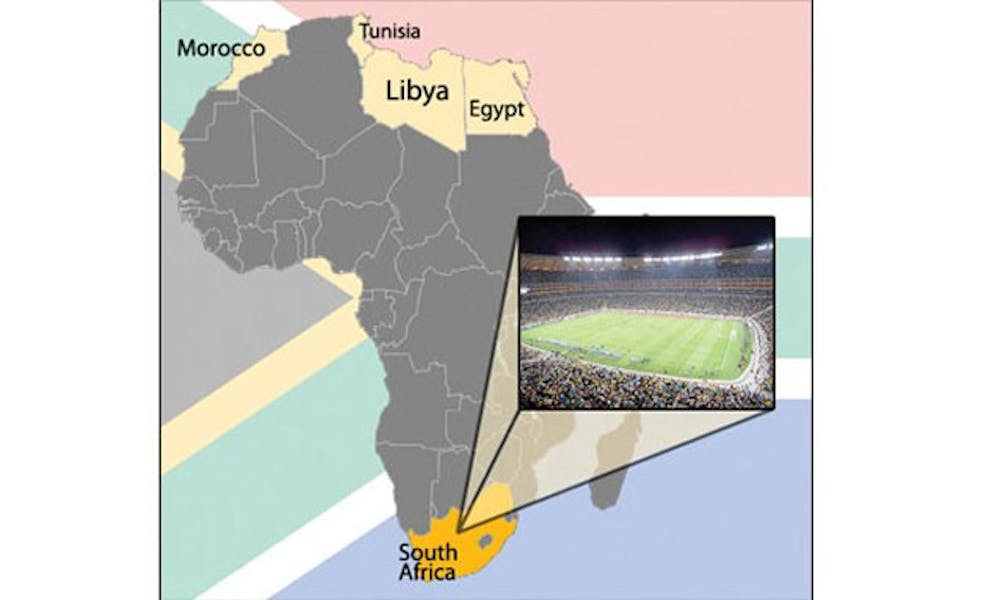Beginning tomorrow, South Africa will host the world’s premier soccer tournament involving squads from 32 different countries. The 19th FIFA World Cup, which will take place June 11 to July 11, is the pinnacle of a series of soccer matches that began in August 2007 with more than 200 teams. According to FIFA’s website, almost three million worldwide fans will converge in South Africa to support their teams on the road to international prestige.
South Africa is the first African country to host the World Cup, after South Africa beat Egypt and Morocco in an African-only bidding process in Zurich in May 2004. Although many critics and opponents doubted South Africa’s preparedness for the event, the country celebrated the completion of five new stadiums and renovations to five other stadiums 100 days prior to the World Cup, according to FIFA’s website.
“Europe really dominates the economy of the sport, that’s where all the money is,” said Laurent Dubois, professor of French studies and history. “FIFA is international but its got a lot of power linked to Europe. Africa has not always been fully integrated into that industry.”
Africa has historically struggled to keep up with social, economic and technological developments in Europe. African societies have long been exploited for natural resources and human capital. After the 1884 Berlin Conference, European powers commenced the Scramble for Africa, in an attempt to colonize various regions of the continent for cheap resources.
Since then, African countries have been characterized by numerous civil wars, disease and poverty. Hosting an event as culturally resonant as the World Cup can be seen as a display of Africa’s progress toward modernization.
“Hopefully people will see a slightly different vision of Africa than they might be used to,” Dubois said. “Africa is obviously a diverse continent and there’s all kinds of different experiences; sometimes the most difficult circumstances come to symbolize the whole thing. Perhaps by seeing the World Cup that might trigger people to think it’s not exactly what they thought.”
For South Africa itself, hosting the World Cup is historically significant. In the mid-1900s, FIFA banned South Africa from the World Cup because the country prohibited blacks and whites from playing together. Although soccer is still primarily a black sport in the country, it is gradually becoming more interracial.
“It is obvious that there are still many who bare scars of discrimination,” said sophomore Sabrina Hamilton-Payne, a native of South Africa. “If there is something that would bring the races of South Africa together, it would be the World Cup.”
Critics have questioned South Africa’s ability to host a tournament of this magnitude. Millions of dollars have been poured into the effort to modernize the country to meet international standards. And on the eve of the first game, many are still doubtful that the tournament will run smoothly.
“There has always been an undercurrent of doubt, like they won’t be able to do it,” Dubois said. “Every World Cup is preceded by a great deal of anxious hand-wringing about all the bad things that are going to happen and usually it’s fine. There are questions; it will be interesting to follow how it plays out. They know their reputation and the way people view them will depend on [the World Cup’s success].”
Get The Chronicle straight to your inbox
Signup for our weekly newsletter. Cancel at any time.

